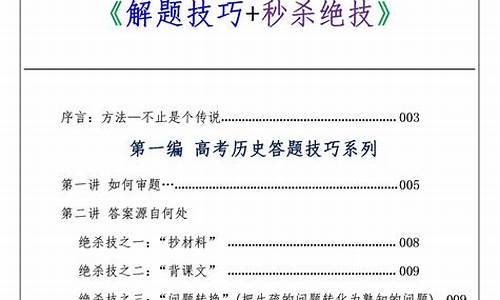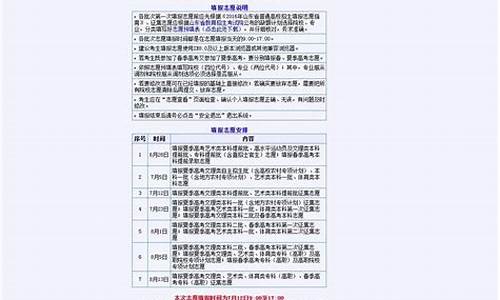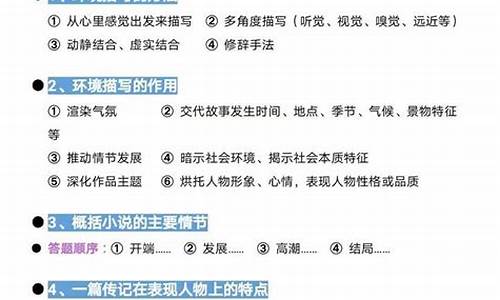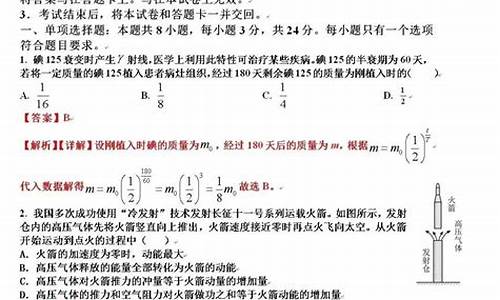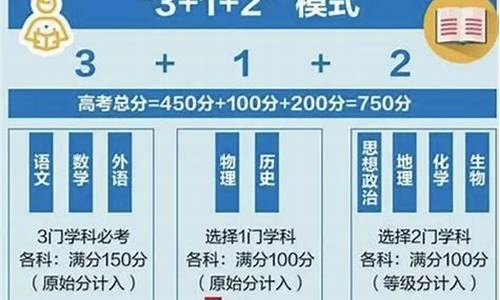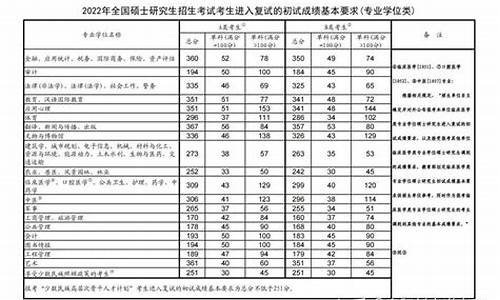您现在的位置是: 首页 > 志愿填报 志愿填报
高考英语语法必考点与常考点归纳(背诵版),高考必考语法
tamoadmin 2024-06-01 人已围观
简介1.高考英语考点2.高考英语语法主要考哪些3.成人高考英语必考知识点导读成人高考作为提升学历的途径,一直深受在职人员的喜爱,当然取得好成绩也是大家都希望的,在成考的众多科目中,英语是提分比较快的科目,英语的学习我们可以从词汇、句型、语法等方面入手进行学习,今天给大家带的是2021成人高考高起点《英语》必考句型,赶紧和小编一起来学习一下。1、“to make…of”的译法(使……成为……,把……当作
1.高考英语考点
2.高考英语语法主要考哪些
3.成人高考英语必考知识点

导读成人高考作为提升学历的途径,一直深受在职人员的喜爱,当然取得好成绩也是大家都希望的,在成考的众多科目中,英语是提分比较快的科目,英语的学习我们可以从词汇、句型、语法等方面入手进行学习,今天给大家带的是2021成人高考高起点《英语》必考句型,赶紧和小编一起来学习一下。
1、“to make…of”的译法(使……成为……,把……当作)
I will make a scientist of my son.
2、“too…+不定式”,“not(never)too…+不定式”,“too…not+不定式”
She is too angry to speak.
3、“only(not,all,but,never)too …to do so”和“too ready (apt)+ to
do”结构中,不定式也没有否定意义,凡是“not”,“all”,“but”等字后+“too…to”,不定式都失去了否定意义,在“too
ready(apt)+to do”结构中,不定式也没有否定意义。
You know but too yell to hold your tongue.
4、“no more …than…”句型
A home without love is no more a home than a body without a soul is a
man.
5、“not so much…as”和“not so much as …”结构。“not so much…as”=“not so much as
…”,其中as有进可换用but rather,可译为:“与其说是……毋须说是……”。而“not so much
as”=“without(not)even”,可译为“甚至……还没有”。
The oceans do not so much divide the world as unite it.
6、“Nothing is more…than”和“Nothing is so …as”结构。“Nothing is
more…than”和“Nothing is so …as”都具有最高级比较的意思,“Nothing
is”可换用“no”,“nobody”,“nowhere”,“little”,“few”,“hardly”,“scarcely”等等,可译为“没有……比……更为”,“像……再没有了”,“最……”等。
Nothing is more precious than time.
7、“cannot…too…”结构。“cannot…too…”意为“It is impossible to
overdo…”或者,即“无论怎样……也不算过分”。“not”可换用“hardly”,“scarcely”等,“too”可换用“enough”,“sufficient”等。
You cannot be too careful.
8、“否定+but ”结构在否定词后面的“but”,具有“which not”,“who not”,“that
not”,等等否定意义,构成前后的双重否定。可译成“没有……不是”或“……都……”等。
Nothing is so bad but it might have been worse.
9、“否定+until
(till)”结构,在否定词“no”,“not”,“never”,“little”,“few”,“seldom”等的后边所接用的“until/till”,多数情况下译为“直到……才……”,“要……才……”,把否定译为肯定。
Nobody knows what he can do till he has tried.
10、“not so…but”和“not such a
…but”结构,这两个结构和“否定+but”的结构差不多,不同之点是这两个结构中的“but”是含有“that…not”意味的连续词,表示程度。可译为“还没有……到不能做……的程度”,“并不是……不……”,“无论怎样……也不是不能……”等。
He is not so sick but he can come to school.
以上的10个2021成人高考高起点《英语》必考句型,就给大家说到这里了,希望大家抓紧时间学起来,当然句型学完后,还是希望大家能够进行篇章练习,不断提高自己的英语水品,加油!
高考英语考点
定语从句、状语从句、非谓语动词必考,主谓一致和冠词会考其中一个或两个都考。几大从句是重点,只要出题人不是突然脑子短路一定会出关于这方面的题。
还有,把更多的注意力放到阅读理解,这才是得分大项,语法复习相当繁琐例如冠词要背很多东西,但看是只出1分的题还只有50%的概率但完型和阅读练好了就完全可以傲视前面的选择题了。
高考英语语法主要考哪些
识在于积累、学习在于思考
1
2015
年高考英语语法单选超级归纳
一、冠词
冠词分为不定冠词(
a, an
)
,定冠词(
the
)
,和零冠词。
I.
不定冠词的用法
1
指一类人或事,相当于
a kind of
A plane is a machine that can fly.
2
第一次提及某人某物,非特指
A boy is waiting for you.
有个男孩在等你。
3
表示“每一”相当于
every
one
We study eight hours a day.
4
表示“相同”相当于
the same
We are nearly of an age.
5
用于人名前,表示不认识此人或与某名人有类似性质的人或
事
—
Hello, could I speak to Mr. Smith?
—
Sorry, wrong number. There isn't______ Mr. Smith here.
A.
不填
B. a
C. the
D. one
That boy is rather a Lei Feng.
(活雷锋)
6
用于固定词组中
a couple of, a bit, once upon a time, in a hurry, have a walk, many a time
7
用于
quite, rather, many, half, what, such
之后
This room is rather a big one.
8
用于
so(as, too, how)+
形容词之后
She is as clever a girl as you can wish to meet.
9
用于抽象名词具体化的名词前
success(
抽象名词
)
→
a success(
具体化
)
成功的人或事
a failure
失败的人或事
a shame
带来耻辱的人或事
a pity
可惜或遗憾的事
a must
必需必备的事
a good knowledge of
精通掌握某一方面的知识
II.
定冠词的用法
1
表示某一类人或物
In
many
places
in
China,
___
bicycle
is
still
___
popular
means
of
transportation.
A. a; the
B. /; a
C. the; a
D. the; the
2
用于世上独一无二的事物名词前
the universe, the moon, the Pacific Ocean
3
表示说话双方都了解的或上文提到过的人或事
Would you mind opening the door?
4
用于演奏乐器
play the violin, play the guitar
5
用于形容词和分词前表示一类人
the reach, the living, the wounded
6
表示“一家人”或“夫妇”
(对比上文的不定冠词用法
5
)
—
Could you tell me the way to ____ Johnsons, please?
—
Sorry, we don’t have ____ Johnson here in the village.
A. the; the
B. the; a
C. /; the
D. the; /
7
用于序数词和形容词副词比较级最高级前
He is the taller of the two children.
8
用于国家党派等以及江河湖海,山川群岛的名词前
the United States, the Communist Party of China, the French
9
用于表示发明物的单数名词前
The compass was invented in China.
10
在逢十的复数数词之前,指世纪的某个年代
in the 1990’s
(
二十世纪九十年代
)
11
用于表示度量单位的名词前
I hired the car by the hour.
12
用于方位名词,身体部位名词
He patted me on the shoulder.
III.
不用冠词(又名零冠词)的用法
1
专有名词,物质名词,抽象名词,人名地名等名词前
Beijing University, Jack, China, love, air
2
名词前有
this, my, whose, some, no, each, every
等限制
I want this book, not that one. /
Whose purse is this?
3
季节,月份,星期,节假日,一日三餐前
March, Sunday, National Day, spring
4
表示职位,身份,头衔的名词前
Lincoln was made President of America.
5
表示球类,棋类等运动的名词前
He likes playing football/chess.
6
与
by
连用表示交通方式的名词前
We went right round to the west coast by ______ sea instead of driving
across ______ continent.
A. the; the
B.
不填;
the
C. the;
不填
D.
不填;不填
7
以
and
连接的两个相对的名词并用时
husband and wife, knife and fork, day and night
知识在于积累、学习在于思考
2
8
表示泛指的复数名词前
Horses are useful animals.
二、
名词和主谓一致
I.
名词的种类
专有名词
普通名词
国名地名人名,团体机构名称
可数名词
不可数名词
个体名词
集体名词
抽象名词
物质名词
特别注意名词类别的相互转换
个体名词与抽象名词的相互转换
例
句
意
义
名词性质
①
She held some flowers in her hand.
②
The trees are now in flower
花儿
个体名词
开花
抽象名词
①
Youth is beautiful.
②
He is a youth of twenty
青春
抽象名词
年轻人
个体名词
①
They have achieved remarkable success in their work.
②
—
How about the Christmas evening party?
—
I should say it was a success.
成功
抽象名词
成功的事
个体名词
物质名词与个体名词的相互转换
例
句
意
义
名词性质
①
Iron is a kind of metal.
②
Please lend me your iron.
铁
物质名词
熨斗
个体名词
①
He broke a piece of glass.
②
He broke a glass.
玻璃
物质名词
玻璃杯
个体名词
①
I bought a chicken this morning
②
Please help yourself to some chicken
小鸡
个体名词
鸡肉
物质名词
抽象名词与个体名词的转换
具有动作意义的抽象名词加用
与某些动词(如:
have
等)连
用,表示某一次短暂的动作
①—
I’d like______information about the management of your hotel,please.
—
Well, you could have____word with the manager. He might be helpful
A.some,a
B.an,some
C.some,some
D.an,a
②
They sent us
word of the latest happenings.
消息
(抽象名词)
A.a
B.an
C./
D.the
③
Could we have
word before you go to the meeting?
话(个体名词)
A.a
B.an
C./
D.the
类例:
have a dream/a rest/a smoke/a swim/a trip/a wash/a discussion/a look
take a walk/a bath
make an advance(
进步
)/make an early start(
早点出发
)
/make a decision/make a change/give a cry of pain(
发出痛苦的叫声
) /give a try
表示知识和时间的抽象名词转
换为普通名词时可以用来表示
其中的一部分
①
Many people agree that___knowledge of English is a must in____international trade today.
A.a,
/
B.the, an
C.the, the
D. /, the
a knowledge of truth(
知道实际情况
)
give a fuller knowledge of China(
提供关于中国更为翔实的知识
)
have a knowledge of shorthand(
有速记的知识
)
②
If there were no examination, we should have______at school.
A.the happiest time
B.a more happier time
C.much happiest time
D.a much happier time
③
is money.
A.The time
B.A time
C.Time
D.Times
抽象名词转换为普通名词可用
来表示“一次、一阵、一种”
具体的行为、事件、现象或结
果。这时名词前往往有形容词
修饰
①
Oh, John. _____you gave me!
A.How a pleasant surprise
B.How pleasant surprise
C.What a pleasant surprise
D. What pleasant surprise
②
She looked up
when I shouted.
A.in a surprise
B.in the surprise
C.in surprise
D.in some surprise
其它例子:
The gift came as a complete surprise to me. We have had some unpleasant surprise
③
It is_____work of art that everyone wants to have a look at it.
A.so unusual
B. such unusual
C.such an unusual
D.so an unusual
II.
名词的数
规则名词的复数形式:名词的复数形式,一般在单数形式后面加
-s
或
-es
(参看有关语法书)
。英语里有些名词的复数形式是不规则的,请
看下表
规
则
例
词
1
改变名词中的元音字母或其他形式
man-men, woman-women, foot-feet, goose-geese, mouse-mice
2
单复数相同
sheep, deer, series, means, works, fish, species
3
只有复数形式
ashes, trousers, clothes, thanks, goods, glasses, compasses, contents
知识在于积累、学习在于思考
3
4
一些集体名词总是用作复数
people, police, cattle, staff
5
部分集体名词既可以作单数
(整体)
也可以作复数
(成
员)
audience,
class,
family,
crowd,
couple,
group,
committee,
government,
population, crew, team, public, enemy, party
6
复数形式表示特别含义
customs(
海关
),
forces(
军队
),
times(
时代
),
spirits(
情绪
),
drinks(
饮料
),
sands(
沙滩
),
papers(
文件报纸
),
manners(
礼貌
),
looks(
外表
),
brains(
头脑
智力
), greens(
青菜
), ruins(
废墟
)
7
表示
“某国人”
加
-s
Americans, Australians, Germans, Greeks, Swedes, Europeans
单复数同形
Swiss, Portuguese, Chinese, Japanese
以
-man
或
-woman
结
尾
的
改
为
-men,-women
Englishmen, Frenchwomen
8
合成名词
将主体名词变为复数
sons-in-law, lookers-on, passers-by, story-tellers, boy friends
无主体名词时将最后一部分变为复数
grown-ups, housewives, stopwatches
将两部分变为复数
women singers, men servants
III.
主谓一致
规则
情
况
举
例
语
法
一
致
原
则
以单数名词或代词动词不定式短语,
动名词短语或从句作主
语时,
谓语动词一般用单数形式;
主语为复数时,
谓语动词
用复数形式。
His father is working on the farm.
To study English well is not easy.
Reading in the sun is bad for your eyes.
What he said is very important for us all.
由
what
引导的主语从句,
后面的谓语动词多数情况用单数形式,
但若表语是复数或
what
从句是一个带有复数意义的并列结构
时,主句的谓语动词用复数形式。
what I bought were three English books.
What I say and do is (are) helpful for you.
由连接词
and
或
both
and
连接起来的主语后面,
要用复数
形式的谓语动词。但若所连接的两个词是指同一个人或物
时,它后面的谓语就用单数形式。由
and
连接的并列单数
主
语
前
如
果
分
别
有
no,
each,
every
或
more
than
a
(an)/one,many
a
(an)
修饰时,其谓语动词要用单数形式。
either, neither, each, every
或
no+
单数名词和由
some, any no,
every
构成的复合不定代词,都作单数看待。
.
Lucy and Lily are twins
The writer and artist has come.
Every student and every teach is in the classroom.
Many a boy and many a girl likes it.
No boy and no girl likes it.
Each of us has a new book.
Is everyone here today?
Somebody is speaking in class.
Everything around us is matter
若
none
of
后面的名词是不可数名词,它的谓语动词就要用单
数。若它后面的名词是复数,它的谓语动词用单数或复数都可
以。
None of the sugar was left.
None of us has (have) been to America.
在定语从句里,关系代词
that, who, which
等作主语时,其
谓语动词的数应与句中先行词的数一致。
Those who want to go please write their names on the blackboard.
He is one of my friends who are working hard.
He is the (only) one of my friends who is working hard.
在强调句型中应与被强调部分一致
It is I who am going to the cinema tonight.
It is we who are going to the cinema tonight.
如果集体名词指的是整个集体,它的谓语动词用单数形式;
如果它指的集体的成员,其谓语动词用复数形式
The police are looking for the lost child.
The cattle are eating grass in the field.
His family has moved to the south .(
他的一家
)
His family are watching TV.
(他的家人)
Class four is on the third floor.
(四班)
Class Four are unable to agree upon a monitor.
(四班的学生)
由
a lot of /lots of/ plenty of/ a heap of/ heaps of/ the rest of/the
majority
of+
名词构成的短语以及由分数或百分数
+
名词构
成的短语作主语时,
其谓语动词的数要根据短语中后面名词
的数而定。
There are a lot of people in the classroom.
Three-fourths of the surface of the earth is sea.
50 percent of the students in our class are girls.
此外,还有
a number of +
复数名词有类似的用法(用复数)
,但
the number of +
复数名词的数就得依
number
而定(用单数)
A number of students have gone to the farm to help the farmer pick
apples.
The number of pages in this book is three hundred.
在倒装句中,谓语动词的数应与其后的主语一致
There comes the bus.
On the wall are many pictures.
Such is the result.
Such are the facts.
Between the two hills stands a monument.
下载文档到电脑,查找使用更方便
5下载券 354人已下载
下载还剩21页未读,继续阅读
成人高考英语必考知识点
一、非谓语动词
“非谓语动词”可分为动词不定式、动名词和分词。它在句子中的作用很多:除了不作谓语外,它可以充当主语、宾语、表语、定语、状语与复合宾语(主语补语或宾语补语)。有些及物动词后面接不带to的不定式作复合宾语。这些动词归纳如下:一感(feel).二听(hear,listen to),三让(have,1et, make),四看(see,watCh,notice,observe)。再加上help somebody(to)do something和美国英语look at somebody do somthing。还有“二让”属特殊:get somebody to do something 与keep somebody doing。而有些及物动词后面接动名词(the -ing form)作宾语。这些动词归纳为一句话:Papa C makes friends。这是由如下动词的开头字母组成:permit,advise, practise,avoid,consider,mind, allow,keep,enjoy,suggest, finish,risk,imagine,escape,need,delay,stand(忍受)。 为了容易记住,也可以编成顺口溜:“允许完成练习,建议避免冒险,考虑延期逃跑,喜欢保持想象,需要反对忍受”。其相对应的动词依次是:permit/allow,finish,practise;
advise/suggest, avoid,risk: consider, delay, escape/miss; enjoy/appreciate, keep, imagine; need/want/require,mind. can't help/can’t stand。
二、复合句
1、学生最容易混淆的是定语从句与同位语从句的区别。
例如:A、The news that our team has won the match is true. (同位语从句)
B、The news that he told us surprised everybody here. (定语从句)
关键的区别在于连接或关系代词that:有意义的是定语, 无意义的是同位。因为引导定语从句的that在从句中作主语或 宾语,而引导同位语从句的that只起到连接词的作用。
2、接着容易混淆的是引导定语从句的关系代词that与 which:that之前是不定(代词)、序数(词)、(形容词)最高级:which之前是介词短语与逗号(非限制性)。
例如:A、All that we have to do is to practise every day.
B、The first lesson that I learned will never be forgotten.
C、I have lost my pen,which I like very much.
D、The house in front of which there is a garden is my home.
三、It的用法
1、It除了代替人和物以外,还可以作形式主语。而真正的主语(不定式、动名词或从句)则放于谓语或表语之后。
例如:It is nor easy to finish the work in two days.
然而有少数表语之后接动名词作真正的主语。这些表语是:无助(no help)、无用(no use)、没好处(no good);工作(hard work)、费时(a waste of time)、又危险(a danger)。
例如:A、It is no use crying over spilt milk.
B、It is a waste of time waiting for him.
2、It还可以作形式宾语。通常下列动词后面可接it作形式宾语:2f2tcjm(find,feel,think,take,consider,judge, make)。
例如:A、He made it clear that he was not interested in this subject.
B、I think it no use arguing with him.
3、It用于强调句式。要强调句子的某一部分(主语、宾语、 状语),可以把it当作先行词。这种句子的结构是:It is(was)+ 被强调部分+that(who)+句子的其余部分。
例如:A、It iS Professor Lin who teaches us English—(强调主语)
B、It was in Shanghai that l saw the film.—(强调状语)
C、It was in 1990 that I worked in the factory.(同上)
但要注意与定语从句的区别。
例如:D、It was 1990 when I worked in the factory.(定语从句)
在强调句式里,我们把强调结构It is(was)…that除去,句子还很完整。如例句C。而例句D就不能。
四、倒装结构
学生容易混淆的是全部倒装与部分倒装。如何区分之,编个顺口溜:副(adv.)介(prep.)提前全倒装,其它句式部分倒;否定提前倒助动,让步状语倒表语;复合句式倒主句,不
倒装的属特殊。下面举例说明:
A、Here comes the bus.(副词提前,全倒装)
B、Here he comes.(代词作主语,不倒装)
C、In front of the house lies a garden.(介词短语提前,全倒装)
D、Never shall I do this again.(否定词提前,部分倒装)
E、Young as he is ,he knows a lot.(让步状语从句,表语倒装)
F、Only when he told me did I realize what trouble he was in.(only 修饰状语,主句倒装)
G、Only he can save the patient.(only修饰主语.不倒装)
H、Not only will help be given to people,but also medical treatment will be provided.(否定词提前,部分倒装)
I、Not only he but also we like sports.(连接两个主语,不倒装)
五、虚拟语气
虚拟语气也是一个难点。所谓虚拟语气是表示说话人的愿望、假设、猜测或建议,而不表示客观存在的事实。它通过句子的谓语动词的特殊形式来表示。现归纳如下:纯假设,用虚拟,动词时态退一级:条件句,分主从,主句谓语前加would (should,could,might);表愿望,用虚拟,wish后面接宾语(从句):现在过去与将来,动词时态退一级:提建议,用虚拟,宾语(从句)动词用(should)do:俩建议,三要求,再加坚持与命令(suggest,advise,demand,require,request,insist,order):It is time和eoukd rather,后接丛句用虚拟:部分主语从句中, 谓语用虚拟结构 (It is necessry /important/natural/natural/strange/strange that……should do)。 下面举例说明:
A、If you came tomorrow,we would have the metting. (条件句虚拟)
B、Without air,there would be no living things.(同上)
C、We wish we had arrived there two hours earlier.(表示愿望虚拟)
D、He demanded that we (should)start right away.(表示建议虚拟)
E、It is(high)time that we left (should leave)now.(特殊从句虚拟)
F、I would rather you gave me the book.(同上)
G、It is necessary that we should clean the room everyday,(主语从句虚拟)
H、He speaks English so fluently as if he were English. (特殊从句虚拟)
总之,语法是从语言实践中总结出来的规则,要边学边寻找规律,以提高学习效率。在学习中不能只记一些语法规则,要进行实践练习。通过练习,可以发现和纠正错误,而且有利于况固所学知识。
许多在职小伙伴会通过成人高考来提升自己,那么成人高考英语必考知识点有哪些呢。以下是由我为大家整理的“成人高考英语必考知识点”,仅供参考,欢迎大家阅读。
成人高考英语必考知识点1. abroad 国外
2. absencen. 缺席(absent adj.)
3. accepted 公认的,可接受的
4. accident 事故(accidental adj. 偶然的;accidentally adv. 偶然地)
5. achievement 成就(achieve v. 获得)
6. address 地址
7. admire 钦佩
8. admit 承认
9. agreement 协议
10. agriculture 农业(agricultural adj. 农业的)
11. altogether 总共
12. ancient 古代的
13. announce 宣布
14. anxiety 忧虑(anxious adj. 焦急的;anxiously adv. 焦急地)
15. apologize v. 道歉(apology n. 道歉;apologetic adj. 道歉的;apologetically adv. 道歉地)
16. apologize/apologise v. 道歉
17. appreciate 感激/欣赏(感激人用thank sb;谢谢某人做的事用appreciate sth.)
18. Asian n. 亚洲人 adj. 亚洲的;亚洲人的
19. assistant 助手
20. astonish 吃惊(astonishment n. 吃惊;astonishing adj. 令人吃惊的;astonished adj. 感到吃惊的)
21. astronaut 宇航员
22. atmosphere 气氛,大气层
23. attempt 尝试(可作名词也可作动词)
24. attentively 专心地
25. attentively 专心地
26. attitude 态度
27. attract 吸引(attraction n.吸引力,具有吸引力的人或物)
28. average 平均
29. average 平均
30. balance 平衡
31. beauty 美(beautiful adj.)
32. believe 相信(belief n. 信念,其复数是beliefs)
33. beyond 超过
34. biology 生物
35. birthday 生日
36. bravery 勇敢
37. broadcast 广播(过去式、过去分词同原形)
38. broadcast 广播(过去式、过去分词同原形)
39. carefully 小心(carefully adv.)
40. ceiling 天花板
41. celebrate 庆祝,赞美
42. celebration 庆祝(celebrate n.)
43. century 世纪
44. challenge 挑战
45. character 性格
46. charge 收费
47. cinema **院
48. comfort v.&n. 安慰,使舒适(comfortable adj. 舒适的;comfortably adv. 舒适地)
49. comfortably adv. 舒适地
50. comment 评论
51. communication 交流
52. competition 竞赛(compete v. 竞赛;competitor 竞赛者)
53. composition 作文
54. concert 音乐会
55. conclude v. conclusion n. 结论
56. condition 情况(conditions条件)
57. confess 坦白,公认
58. congratulation 祝贺(congratulate v.)
59. constantly 不断地
60. construction 建设,建筑物
61. continue 继续
62. contribution 贡献(contribute v.)
63. conveniently 方便(convenient adj.)
64. conversation 谈话
65. cough 咳嗽
66. cousin n. 堂兄弟姊妹;表兄弟姊妹
67. cruelty 残酷(cruel adj. cruelly adv.)
68. curious 好奇的(curiosity n. 好奇)
69. curious 好奇的(curiosity n. 好奇)
70. customer 顾客
71. customer 顾客
72. custom 习俗
73. damage 损坏
74. declare 声明,宣布
75. delicious 美味的
76. destroy 毁灭(其过去式是destroyed)
77. determined 有决心的
78. develop 发展(development n.;developing 发展中的;developed 发达的)
79. dialogue 对话
80. diary 日记(dairy 奶制品)
81. difference 不同(有复数形式)
82. disappointed 感到失望的(disappointing 令人失望的)
83. disappointment 失望
84. discovery 发现(其复数是discoveries;其动词是discover;discoverer 发现者)
85. disturb 打扰
86. dollar 美元(其复数是dollars)
87. downstairs 在楼下,下楼
88. dream 梦想(其过去式是dreamed或dreamt)
89. electricity 电(electrical 和电有关的;electric 带电的,电的)
90. employ 雇用(employment n.;employer 雇主;employee 雇员)
91. empty 空的,清空(可用动词,其过去式是emptied)
92. encourage 鼓励(encouraging,encouraged,encouragement )
93. energy 能量
94. envelope 信封
95. envy n. 妒忌(envious adj.)
96. equal 平等的,相等的
97. equipment 设备
98. especially 尤其是
99. essential 基本的,本质的
100. European 欧洲人
101. event 事件
102. excellent 极好(excellence n. excellently adv.)
103. exhibition 展览,展览会
104. exhibition 展览
105. expense 耗费,花费
106. experience 经验(experienced 有经验的)
107. expert 专家
108. expression 表达
109. failure 失败(fail v.)
110. familiar 熟悉的
111. familiar 熟悉的
112. favorite 最喜爱的(即作形容词也作名词,作名词时有复数)
113. figure 人物/数字/身材/画像,计算/认为
114. finger 手指
115. flight 飞行,航班
116. forehead 前额
117. foreign 外国的
118. fortunately 幸运地
119. forward 向前
120. freezing 极冷的(frozen 冷冻的)
121. frequently 经常地
122. furniture 家具
123. further 进一步的
124. generally 一般地,大体上
125. geography 地理
126. Germany 德国
127. government 政府
128. gradually 逐渐地
129. graduation 毕业(graduate v.)
130. grammar 语法
131. habit 习惯
132. handkerchiefs 手帕
133. honesty 诚实的(honest v.)
134. honor/honour 荣誉;尊敬
135. imagination 想象力(imagine v.)
136. immediate 立刻的
137. immediately 立刻地
138. impress 印象(impression n.)
139. incident 小事件
140. including 包括(include v.)
141. indispensable 不可缺少的
142. industry 工业(industrial adj.工业的)
143. information 信息
144. inspire 激励(inspiration n. inspiring adj. inspired adj.)
145. institute 学院
146. instrument 乐器,工具
147. interest 兴趣,利息
148. interrupt 打断
149. interrupt 打断
150. introduce 介绍(introduction n.)
151. irregular 不规则的
152. journey 旅程
153. judge 判断,审判(judgment n.)
154. kindergarten 幼儿园
155. knowledge 知识
156. labor/labour 劳动
157. lately 最近
158. laughter 笑声
159. lawyer 律师
160. librarian 图书馆理员
161. loss 损失(lose是其动词形式)
162. luckily 幸运地
163. magazine 杂志
164. majority 大多数
165. majority 大多数
166. manage 管理,设法(manager,management)
167. market 市场
168. marriage 结婚 (marry v. 结婚;married adj.已婚的)
169. material 物质/材料
170. material 物质/材料
171. mayor 市长
172. mean v. 意味,打算 adj. 吝啬的,卑鄙的
173. measure 测量
174. medal 奖章(比较:model 模型)
175. memory 记忆力(memorize v.记住;remember v.记得)
176. message 信息,启示
177. metal 金属
178. modern 现代的
179. modest 谦虚的
180. monitor 班长/监控
181. moustache 胡子
182. murder 谋杀(murderer 凶手)
183. musician 音乐家
184. mysterious 神秘的(mystery n.神秘)
185. nationality 国籍(nation 国家,national国家的)
186. naturally 自然地
187. naughty 淘气的
188. necessary 必需的
189. ninth 第九
190. normal 正常的
191. obey 服从,遵守
192. obviously 明显地
193. offer 主动提出,提供,出价
194. operation 手术,操作
195. opportunity 机会
196. ordinary 普通的
197. organize/organise 组织
198. particularly 特别是,尤其是
199. passenger 乘客
200. programme (美program)n. 节目;项目
201. patience 耐心(patiently)
202. patient 病人;耐心的
203. perfect 完美的
204. perform 执行;表演
205. perhaps 也许
206. period 时期
207. permission 许可
208. persuade 说服
209. phenomena 现象
210. physicist 物理学家
211. pilot 飞行员
212. poisonous 有毒的(poison)
213. political 政治的(politics)
214. popular 受欢迎的;流行的
215. population 人口
216. position 职位
217. possibility(-ies) 可能性
218. possible 可能的
219. poverty 贫穷(poor)
220. practical 实际的,实用的
221. prepare (使)准备
222. pressure 压力
223. pretend 假装
224. professor 教授
225. profit 利润
226. progress 进步
227. pronunciation 发音
228. provide 提供(比较:offer,supply)
229. public 公众的;公立的
230. purpose 目的;意图
231. quality 质量
232. quantity 数量
233. realistic 现实的;逼真的
234. receive 收到
235. recently 最近
236. recognise/recognize v. 认出;承认
237. recognition n. 认出;承认
238. regards 问候
239. remind 提醒
240. repeat(repetition) 重复
241. respect 尊敬
242. restaurant 餐馆
243. satisfy 使满意(satisfied,satisfying)
244. satisfaction 满意
245. satisfactory 满意的
246. Saturday 星期六
247. scientific 科学的
248. science 科学
249. secretary 秘书
250. secretly 秘密地
251. separately 单独地
252. separate 分开
253. serious 严重的(seriously)
254. service 服务
255. shortcoming 缺点
256. silence 安静(silent)
257. similar 相似的
258. similarity 相似性
259. situation 形势/情况
260. slightly 轻微地
261. society 社会(social adj.社会的)
262. southern 南方的
263. special 特别的
264. species 物种(单复数同形)
265. spring 春天;泉水;弹簧;弹跳
266. square 平方;广场
267. steal 偷窃
268. straight 直的,直接的
269. suitable 合适的
270. support 支持
271. surprise 使惊奇
272. surround 包围
273. swim 游泳
274. technique 技术(technical adj.)
275. technology 科技
276. temperature 温度
277. theory 理论
278. thirsty 口渴的
279. thorough 彻底的
280. total 合计
281. traffic 交通
282. translate 翻译
283. translation 翻译(translator 译者)
284. interpret 解释;翻译(interpreter 口语翻译)
285. umbrella 伞
286. unusually 不寻常地(unusual不寻常的)
287. unwilling 不愿意的(willing adj. 愿意的;will n. 意志)
288. upstairs 在楼上;向楼上
289. vacation 假期
290. variety n. 种类
291. various 各种各样的
292. victim 受害者
拓展阅读:成考复习大纲词汇与语法
同学们需掌握2000个(专升本为3800个)左右常用英语单词和一定数量的短语,以及对应的基本用法和基本语法规则。
对于这类题,同学们平时应多积累词汇,并掌握相关的用法,熟悉常考的语法规则,比如各种时态等,并且对于《补全对话》,同样也是适用。
完形填空
很多同学抱怨完形填空难,在英语考试中,出题范围广,得分也难。
但也不是没有办法攻克,建议大家在做题的过程中:
第一遍先不看题目选项,直接阅读全文了解文章大意。
第二遍一边读一遍对照着题目做题;第三遍检查的时候阅读全文,看是否条理清晰、通顺流畅、符合逻辑,是否需要调整答案。
积累词汇很重要,特别是需要对动词、名词、形容词、副词等多种词汇的意义理解清楚,并了解如何运用,其次要多做完形填空的训练,做多了自然而然就掌握了一定的填词技巧。
经常作为正确单词出现的一般有:however、although、yet、because、but、by、of、offer、only if、as if、that、which、any、such as、something等等。
经常作为错误单词出现的一般有:since、if only、what、in case等等。
阅读理解
要提高阅读理解的能力,平时一定要进行阅读训练。
首先得从词汇量及阅读解题这两个方法入手。
词汇:一定要不断扩大自己的词汇量。
(PS:如果在考试中碰到了不认识的单词,但对文章的理解并没有起到很大作用的,不必过度纠结浪费时间。)
有些会影响文章理解的单词不认识的话,这时同学们就要学会猜词。
最常见的两种猜词法为:
1、根据构词法的规则猜;
2、结合上下文,运用自己知道的知识分析猜出词义。
解题方法:
1、简单易懂短小的文章选择先看文章后做题;
2、先看题目,带着问题去文章中有目的的寻找答案;
3、阅读中着重首段和尾段及每个段落的首尾句,一般文章里的这些内容都表达了主干,阅读明白了也对文章核心意义有了把握。
写作
写作一直是很多同学难以克服的难题,许多同学都是看着题目却无话可说,最后写出内容空洞、无趣的作文。
那么如何写好作文呢?
1、依旧是积累自己的词汇量,积累的单词多了,就能运用单词写出更多的句子。
2、通过扩大阅读量,提升英语写作能力,阅读量大了,理解力强了,能运用到这个文章的句子也就有所选择。
3、对于做题比较慢的同学来说,多记一些热门词汇,名人名言以及俗语,更好的运用进句子里,这样也会使你的文章更有看点也更有层次,从而取得高分。
但凡考试,心态很重要,希望大家调整好自己的心态,不要对英语考试产生恐惧,要用积极的心态面对考试。
上一篇:高中量子物理学史_高考量子物理
下一篇:英语学案高考,英语学案模板全英文
